PRE-OP INSTRUCTIONS
Any type of surgery is a serious procedure that carries certain risks,
and thorough preparation is essential for a successful outcome.
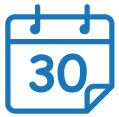
30+ DAYS BEFORE
Stop smoking and hormonal drugs
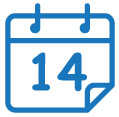
14 DAYS BEFORE
Start antacids twice a day
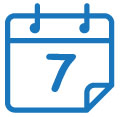
7 DAYS BEFORE
Stop all NSAIDs
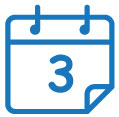
3 DAYS BEFORE
Full liquid diet stage
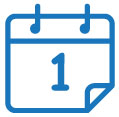
1 DAY BEFORE
Pre-op tests
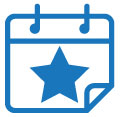
THE BIG DAY
What is allowed and NOT allowed
STAGE “30+ DAYS BEFORE”
- Stop all pregnancy preventive oral medications and hormonal medications at least 3 or 4 weeks before surgery as they increase blood clot risks.
Carefully review the following information that refers to hormonal medications only.- What to consider? Medications based mainly on 2 types of hormones:
Estrogen: increased risk of blood clots.
Progestin: no evidence of increased risk of blood clots. - Only those contraceptives that contain estrogen should be avoided before surgery, listed below in the order of higher blood clot risk:
Oral pills
Injections (only those that apply every month)
Vaginal rings (NuvaRing). No need to remove it pre-op, but additional blood thinners will be prescribed upon hospital discharge (extra cost applies).
Skin patches - Medications based on progestin that do NOT increase blood clot risk:
Injections (only those that apply once every 3 months)
Implants (subcutaneous arm implants)
IUD hormonal (Mirena)- If your contraceptives include estrogen, it is recommended to stop them 1 month pre-op in order to decrease blood clot risks. Using other methods such as condoms during this period of time are recommended (or abstinence – 100% protection 😊).
- Resume hormonal contraceptives 1 month after surgery on the first day of your first menstruation (this is to ensure that you are not pregnant before you start hormonal medications again).
- The risk of postoperative thrombosis (blood clots) depends on many factors, not only on the type of contraceptives used. But it is always recommended to decrease the risks as much as possible.
- What to consider? Medications based mainly on 2 types of hormones:
- Stop smoking or vaping (if not possible to stop entirely, reduce the number of cigarettes to 1 or 2 a day). Remember that smoking slows down healing time by narrowing blood vessels, restricting blood flow to the surgical site, potentially it could cause tissue necrosis and stomach leak; not to mention possible cardiovascular issues, anesthesia complications, infections, etc.; smoking after surgery can cause gastritis and ulcers in the stomach pouch, this is especially common among Mini or RNY bypass surgery patients.
- Stop consuming alcohol (it supplies empty calories that are not part of the low-carb protein pre-op diet). If you must have a drink at a social gathering on a special occasion, you may have one small drink as an exception, but absolutely no alcohol is allowed 7 days pre-op as it is blood thinning and will cause post-operatory bleeding.
- Stop all beverages with caffeine, including energy drinks (you may switch to decaf for a week or two for an easier transition to no-coffee-at-all). All types of coffee must be stopped at least two weeks prior to surgery.
The reasons why coffee must be stopped completely at least 2 weeks pre-op are:
1. Coffee is acidic and irritates the stomach. Our goal is to reduce stomach acid production and thus stomach irritation before and after surgery. For that reason coffee is not recommended for at least 2 weeks pre-op and 1.5-2 months post-op (the longer the better). If you must resume coffee sooner, look for low-acid options and avoid coffee on an empty stomach.
2. Coffee is known to increase appetite and this works against the surgery purpose.
3. Coffee withdrawal can cause strong headaches and general weakness. If you do not stop coffee prior to surgery, you will be forced to stop it during surgery. Such abrupt change in addition to the surgery itself and the low-calorie diet will cause strong migraines and increased fatigue. We highly recommend weaning off coffee gradually starting 1 month pre-op. - Exercising. Discuss with your physician a routine exercise program suitable for your health condition and joints. Patients with cardio-vascular or joint diseases are not required to exercise. Otherwise start walking or doing elliptical for 30 minutes daily, and if possible, consider swimming – the best option that is completely safe for your joints and muscles. You will resume exercising 2 months after surgery.
- Stop smoking marijuana. Consumption of marijuana before and after surgery increases risk of complications to a greater or lesser degree, during general anesthesia you can develop low blood pressure, have problems with your heart (depending on the dosage), and during the postoperative period the pain could be difficult to control. Also, one of the most common side-effects of using marijuana is increased levels of hunger, which works against the purpose of surgery.
STAGE “14 DAYS BEFORE”
Regardless of whether you have acid reflux/heartburn or not, start taking Omeprazole (PPI medication, PPI stands for Proton Pump Inhibitor). It is availale over the counter (OTC).
Dosage: 1 pill of 20 mg twice a day, 30 min before meals (that is every 12 hours, total dosage 40 mg per day). Continue for two weeks prior to the surgery (the last pill to be taken the evening before surgery, do NOT take it on the day of surgery). This is to decrease stomach acid production and later acid reflux, nausea, inflammation, and swelling caused by the procedure.
Usually, the recommended dosage mentioned on the box will say 20 mg per 24 hours. Please disregard this recommendation. Our goal is to decrease stomach acid production prior to surgery and post-op; thus, a higher dosage is required.
Continue taking PPI medication after surgery for at least two months (gastric sleeve) and at least three months (gastric bypass RNY/Mini). After 2/3 months you may start weaning off PPI gradually only if you don’t experience acid reflux symptoms. Consult with your surgeon or nutritionist to make sure you are ready to stop the PPI.
VERY IMPORTANT!
Never skip the dosage! Take PPI for as long as prescribed twice a day. You must complete the 2- or 3-months therapy (for gastric sleeve or bypass accordingly) after surgery and shouldn`t stop sooner only because you don`t feel any discomfort. This may lead to marginal ulcers and other complications. Learn more at PPI & Antacid in Weight Loss Surgery.
Tip: you can purchase a 2-month supply of PPI medicine over the counter in Mexico for under $15 USD (inquire with your on-site facilitator to help you place an order with a local pharmacy). In case you are already taking PPI`s, continue as prescribed by your doctor. If your regular dosage is 40 mg once a day, you may continue. If your regular dosage is 20 mg once a day, increase it to 20 mg twice a day. If you usually use other brands of anti-acids (Omeprazole (Prilosec), Pantoprazole (Pantozol), Esomeprazole (Nexium)), you can continue your prescribed PPI.
STAGE “7 DAYS BEFORE”
Important
Consult with your surgeon about medications you are taking and when they need to be stopped (usually it is discussed during the pre-op consultation).
Stop all NSAIDs 7 days prior to surgery
(Aspirin, baby low-dose Aspirin, Advil, Aleve, Ibuprofen, Nuprin, Naproxen, or any other non-steroidal anti-inflammatory medication, this includes most arthritis medications). If you are not sure, please check with your patient coordinator. For headache or minor pains, you may use Tylenol (including the day of surgery). You may resume some of these medications 7 days after surgery (some medications may be resumed sooner), however consult with your doctor regarding NSAIDS (for example only if you have heart issues you may resume taking low-dose Aspirin or other blood thinners 7 days post-op but always after you take an antacid pill (Omeprazole) to protect your stomach, which should be taken daily for at least 2 months after surgery; we highly recommend changing pain medication like Ibuprofen to Tylenol, or Celebrex, or Meloxicam, as Ibuprofen may cause gastritis and ulcers; Ibuprofen and other NSAIDs after WLS can be taken only if absolutely necessary, and always with an antacid pill taken 30 minutes earlier to protect your stomach. Ideally you should use Tylenol only. Please always consult with your doctor before you resume certain medication after surgery.
You may stop taking all vitamins when you begin the liquid diet stage, as taking vitamins on an empty stomach or without solid foods may cause nausea.
If you need to bring your prescription medications to Mexico:
Please have all your prescription medications that you need to take daily in their original bottles, do not bring them in a pill dispenser. The bottles must have the name of the medication on them as well as your personal name, and bring only the number of pills sufficient to cover your trip (your stay in Mexico + travel time), not more than that. If you bring more pills than needed for your stay, our on-site team will ask you to discard the remaining ones (especially if they are controlled medications such as antidepressants, anti-anxiety, ADD/ADHD medication) before heading toward the border, and the border police officer may send you into a secondary inspection.
STAGE “3 DAYS BEFORE”
Full-Liquid Diet Stage
During the last 3 days before surgery (not including the day of surgery, if surgery is on Monday, the 3 days before include Fri, Sat, Sun) it is required that you follow a full-liquid diet. This “liquid stage” can be increased to 5, 7 or more days by the surgeon depending on your BMI and duration of the solid food diet stage. The surgeon will let you know if you are required to increase the “liquid stage” during your pre-op consultation.
MACROS
Do not be overly concerned about your macros during this stage.
Stay under 1,200 calories per day.
Protein shakes or unflavored protein powder added to your savory liquid meals will satisfy your daily needs in protein.
Do not consume any regular milk or any fruit juices in order to keep your carbs under control.
Your liquid meals can include the following options:
- Plain Greek yogurt (or regular sugar-free yogurt), you may use natural liquid Stevia sweetener.
- Protein shakes with low (3 g) or “0” carbs and low or “0” fat (good protein shake should include no more than 3 g of sugar and no less than 20 g of protein); limit protein shakes to 3 or 4 per day as they are considered meal substitutes.
- Almond milk (regular or low-fat cow milk is not recommended due to high sugar levels – lactose).
- Broth (chicken/beef/fish/vegetable broth, or liquid part of any other type of soup), feel free to add a scoop of unflavored protein powder to your broth to feel full (do not add protein powder to hot liquids as it will curdle, add powder only to cold or slightly warm liquids and allow sufficient time to dissolve).
- Egg-drop soup (strained).
- Carrot, zucchini, or squash cream soups (well-blended and strained, so there are no solid pieces, add enough water to make it thin, NO cream to be added, a little bit of milk for better taste is acceptable); you may add unflavored protein powder.
- Sugar-free pudding/Jell-O/popsicles.
- Fruit-infused water, especially with electrolytes, and plenty of water or herbal/fruit tea without sugar, coconut water and other sugar-free fluids are recommended.
- Green juices (kale, spinach, celery, etc.) are allowed, fruit juices are not allowed as they contain too much fructose (another form of sugar).
We do not recommend chewing gum before or after surgery as it stimulates stomach acid production and could cause worse acid reflux after surgery as well as make you feel more hungry.
The purpose of the full liquid diet stage is to cleanse your stomach pouch and bowel from any kinds of solids; to reduce the amount of stomach acid produced, thus decreasing chances of having heart burn issue after surgery; giving your stomach a rest which helps to decrease stomach pouch swelling during the first days of recovery; shrink your liver. Thanks to this stage it is not necessary to take laxatives prior to surgery, the liquid diet will be sufficient.
Important! Drink plenty of water. You should consume at least 64 oz of clear sugar-free liquids per day! Do not count protein shakes, soups or any other non-clear fluids toward these 64 oz.
MEAL PLAN
for liquid pre-op diet stage
Sample
Breakfast
Option1: 1 premier protein shake or 1 cup unsweetened almond milk + 1 scoop Isopure + ice (blended)
Option 2: 1 cup pf Greek yogurt (You can have flavored yogurt, just make sure its sugar free)
Snack
Option1: 1 cup sugar free Jell-O
Option 2: ½ cup sugar free pudding made with fat free milk.
Lunch
Option1: 1 cup of spinach/zucchini soup + ¼ cup of Greek yogurt for extra creaminess
Option 2: 1 cup of carrot/ squash soup + 1 scoop of flavorless protein powder
Snack
Option1: 1 cup miso soup
Option 2: 1 cup chicken broth
Dinner
Option1: Vegetable Garden soup (zucchini+ carrots + squash) + 1 scoop flavorless protein powder + ¼ cup Greek yogurt for extra creaminess
Option 2: Caramel macchiato protein shake: 1 cup of sugar-free almond milk +2 scoops of GENEPRO plant protein powder + ½ cup of ice +2 drops of Sweet Leaf Caramel Macchiato
Snack (if necessary)
Option1: Greek yogurt popsicle (Use a popsicle mold and fill it with vanilla or any flavored sugar free Greek yogurt)
Option 2: ½ cup sugar free pudding made with fat free milk.
Consider our featured bariatric-friendly “liquid” recipes:
STAGE “1 DAY BEFORE”
Pre-op Tests Stage
Usually, pre-op tests are done on the day of arrival (the day before surgery) provided the patient arrives before 2:00 or 3:00 p.m.). If you are not sure about the time of your pre-op tests, please consult your patient coordinator. On the day of pre-op testing you must avoid lactose (protein shakes clear or regular, yogurt, milk, etc.) and avoid liquids that contain fat (chicken broth or any other type of broth/soup). You may drink such liquids as water, apple juice (be mindful as it is high in sugar), Gatorade, sugar-free popsicles or Jell-O up until 3 hours before your arrival in San Diego. After that you should drink only water until blood work is done. After the blood has been drawn, you may resume other fluids that may include protein shakes, broth, etc. The reason why it is necessary to avoid lactose, liquids with fat, and sugar for a certain period of time before blood work, is so that those ingredients do not affect the results of the blood work.
STAGE “THE BIG DAY”
What is allowed / NOT allowed
- Stop drinking all fluids other than water by 10-11 P.M. the night before surgery. It is very important that you drink lots and lots of fluids during the 3-day liquid diet to be well hydrated for the day of your surgery.
- You may take medications for diabetes (insulin), high blood pressure, thyroid, anxiety, or antidepressants as indicated by your physician early in the morning with just a few sips of water (ideally take them no later than 6 am).
- If your surgery is scheduled later in the morning or afternoon, you may continue drinking plain water up to 4 hours before surgery.
- You may brush your teeth normally.
- Take a shower with soap the night before surgery or in the morning.
- There is no need to do bowel cleansing neither before gastric sleeve nor bypass surgery, as the liquid diet stage will cleanse your bowel sufficiently.
- Jewelry. Take off all the jewelry and leave it at home! If you cannot take your ring off, or piercing, anesthesiologist will wrap a piece of tape around it to protect your skin from burns. However, in rare cases jewelry may interfere with the electrocautery machine used during anesthesia, and may need to be cut off.
- Nails. Very important! At least one fingernail must be FREE FROM ANY TYPE OF POLISH (acrylic, gel, regular polish, transparent or colored, it doesn`t matter) as the layer of nail polish does not allow the oximeter to capture correct amount of oxygen in your blood during anesthesia and recovery. Thus, you must have at least 1 or 2 fingers available with natural clean nails, not too long (about 5-6 mm or ¼ of an inch), as you will have a clip-on oximeter attached to your finger and if your nails are too long, it will not stay on and a nurse will have to shorten your finger nail. Toenails can have any type of polish you like.
- Remove artificial eyelashes and makeup. During anesthesia when all body muscles are relaxed, to keep your eyes closed and avoid irritation and dry eyes, the doctor will apply either tape or special eye covers that may damage artificial eyelashes. For your own convenience and to avoid possible infection, please remove them prior to surgery.
- Remove dentures, contact lenses, eyeglasses, female sanitary items (tampons), any underwear, wigs.
- For male patients – BEARD & CHEST. If possible, please shave your beard (or trim if it is long), and your chest. A beard that is a few days old is acceptable although not recommended; a long beard may not allow for the medical equipment (oxygen mask) to be placed correctly; not to mention sanitary purposes. Shaving your chest will prevent discomfort from removing sticky items such as monitors during an ECG test.
For Same-Day Arrival (Vertical Sleeve or RNY Bypass Surgery)
- All the above applies. Stay on a full liquid diet 3 days before and arrive on an empty stomach the day of surgery (you may drink only water early in the morning).
- Wear compression stockings (medium pressure, knee high) during your flight (this is recommended especially for patients with high BMI over 50), practice leg muscle contraction during flight, get up and move every 45 minutes, move your feet – these are blood clot preventive measures.
- Plan to arrive in San Diego by 11 am at the latest on the day of surgery.
And last but not least: relax and trust your doctors! You are in good hands!
